Caribbean Embraces Minister Farrakhan
By Richard B. Muhammad Editor | Last updated: Apr 6, 2012 - 1:49:53 PMWhat's your opinion on this article?
* Minister Farrakhan: Touching lives and teaching in Trinidad (FCN, 03-27-2012)
* Farrakhan opens visit to Caribbean in Trinidad (FCN, 03-23-2012)
Antigua welcomes Nation of Islam delegation; applauds call for a United Caribbean for regional survival, progress
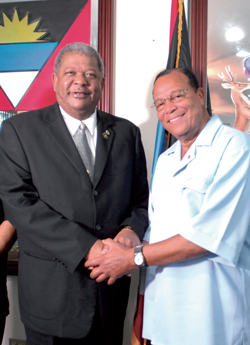
ST. JOHN’S, Antigua (Finalcall.com) - This island’s loving embrace of and respect for Louis Farrakhan was evident: There was live television and radio coverage of his airport arrival. He was openly embraced by Prime Minister Baldwin Spencer and in media appearances. Then a standing room crowd, with people listening in a parking lot, flocked to his only public address.
“God wants to lift us up again, that the bottom rail will come to the top, that the tail will become the head, and that we who once were a great people will once again by the power of God be brought back to our original position as the mother and the father of civilization,” said Min. Farrakhan, who was nearly surrounded by the crowd packed inside the Multi-Purpose Center for his March 28 public address.
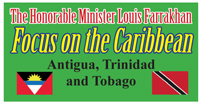
|
Seating in the venue was filled eight minutes after the time for the program to begin. Eager Antiguans and Barbudans quickly began to fill an upstairs balcony where they would stand for the near 90-minute lecture.
In the parking lot another 500-600 people watched the address on a video screen set up to accommodate the overflow crowd. The public outpouring in Antigua was similar to the popular response the week before in Trinidad, where auditoriums were also full and overflow crowds listened to the message on speakers set up outside.
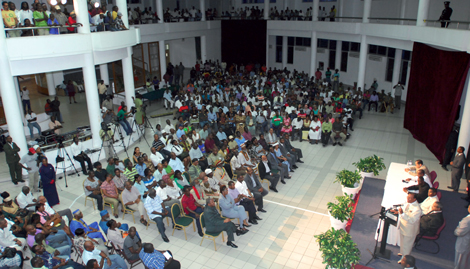
Audience at the Multi Purpose Center in Antigua was packed for Min. Farrakhan’s address. Photos: Richard B. Muhammad
|
Min. Farrakhan used scripture and the history of colonialism and slavery to describe the roots of division plaguing the region and the misuse of religion to keep Black people under White control. Saying he was reiterating a message of unity that had been around for some time, the Minister noted that it would take political maturity to make the idea of a united Caribbean a reality.
“We have to think of more than Antigua and Barbuda, we have to think of the Caribbean as a whole because all of us are the sons and daughters of Africa,” said Min. Farrakhan.
“Whether we speak Spanish, French, Portuguese, Dutch, English, none of us came to the Caribbean speaking those languages.”
The names and the languages are holdovers from colonial masters as Black slaves were robbed of their language and culture, and as European masters fought one another, those same enmities were put into the slaves, fostering modern divisions, Min. Farrakhan explained.
All of the colonial masters, however, gave Blacks their religion, the Minister noted.

A standing room audience in the Multi Purpose Center.
|
“You have to question when a man treats you as bad as we were treated, how would he give you a God that would free you from his grip?” asked Min. Farrakhan. The crowd responded with loud applause and cheers.
He asked the largely Christian audience if it had read the Gospel of Matthew, Luke and John or heard pastors teach from the Gospels. Jesus never said I am a Christian and when the Apostle Paul taught at Antioch the followers of Jesus were called Christians, he said.
Yet, the Minister continued, we fight over a name that Jesus never used for himself.
Christian, Muslim and Jew are names that “have value but when we use them for divisive purposes, they become the instrument of Satan that keeps people of God divided against themselves,” he said.
The division continues inside the individual faiths with disputes over schools of thought and denominations, he observed. The division needs to end, said Min. Farrakhan.
Jesus also never tried to take God’s place as an object of worship, Min. Farrakhan said. Jesus was the “reflection of the good of his father,” and said his followers must deny themselves. That means putting off “vanity that makes you seek advantage for yourself and not the kingdom. … What you find is that people want the kingdom but they don’t want the cross,” said Min. Farrakhan.
“When you are willing to suffer for righteousness sake, suffer for freedom sake, for justice sake, for equality sake, you have picked up the cross of Jesus Christ,” said the Minster.
The solution to the problems that Blacks face is a spiritual one and no economic plan will work without the proper spiritual foundation, he added.
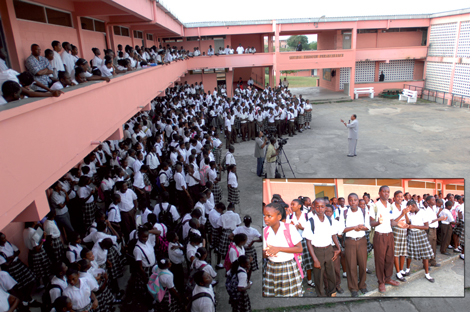
Minister Farrakhan speaks to students from the Otto Comprehensive School of Antigua. Photos: Richard B. Muhammad
|
Misuse of religion by oppressors
The images of Christ planted in the minds of Blacks, after 300 years of not being allowed to read the Bible, and scripture were designed to keep slave masters in control, said the Minister. Jesus was made White though the Bible says Jesus is from the linage of Solomon, who was Black, Min. Farrakhan noted. Science also bears witness that Whites cannot produce Black but Black can produce all the other colors of people, making Blacks the first people on the planet, he said.
Slave masters did not allow slave preachers to use the Old Testament with an eye for an eye but twisted New Testament scripture to control the slaves, Min. Farrakhan continued.
So in Haiti, it was voodoo and a Muslim who ignited a successful revolution, he said. “What the enemy has done has made us hate what we had in Africa,” Min. Farrakhan said. Blacks are the “ancient of days” described in scripture, he said. Knowing this would make Blacks proud, Whites never taught this knowledge.
Modern struggle found in scripture
Scripture foretells the plight of Blacks in the Caribbean and just as there were plots against the children of Israel and, in particular, the killing of male children, these plots are playing out today, he said.
Black men are dying in gang warfare, non-productive, and not going to college but it is tied to systematic miseducation that includes teaching Whites are divine and Blacks are cursed, he said.
“Spiritually we are sick and you need a doctor to open the eyes of the blind, make the dead hear, make the dumb speak and raise a people on a dead level to life,” said Min. Farrakhan.
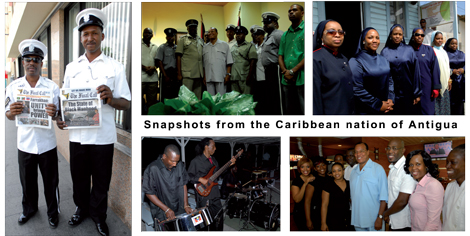
|
As a man thinks in his heart so is he, so if you don’t like kinky hair or love yourself, it is manifested in actions or the lack of action, he said. “When you think you’re inferior, how do you act? Inferior.”
And if you think Black skin is a curse and Blacks are the children of Ham doomed to servitude, as the Jewish scholars wrote in the Talmud, it will have a negative impact, he said.
But, the Minister said, the Trans-Atlantic slave trade proved Blacks are the strongest of the strong and despite all the wickedness endured, in America a Black man is over the house where Blacks were once slaves as a sign of divine potential.
But as the Holy Qur’an says, God will never change a condition of a people until they change themselves, we are the ones that have to change, said Min. Farrakhan.
As light of sun strikes the earth, causing it rotate, divine wisdom is needed to move Black people forward, he said. Whites cannot educate Blacks to free us from their control, an independent teacher must be sent, added Min. Farrakhan. “God has to do that for you and he has,” he said.
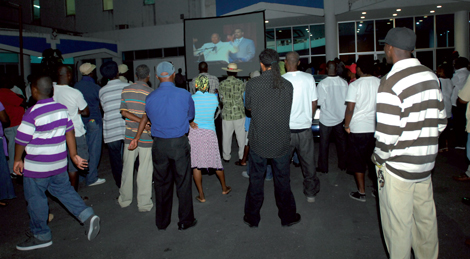
Overfl ow crowd watches Min. Farrakhan’s address from video monitor outside the Multi Purpose Center in Antigua.
|
And as scripture says blessed are the poor in “spirit,” spirit is the energy of life reflected in business activity, said Min. Farrakhan. Blacks hold political power but the economic power of the Caribbean is wielded by Indians, Chinese, Lebanese, Arabs, Asians, and Whites, he noted.
Others are feeding the Caribbean and the people are dying from imported and poisoned food products, he said. That must stop, Min. Farrakhan said. “They are killing us with our taste buds and our love of sex,” he warned. The Caribbean has the second highest prevalence of HIV/AIDS infections behind sub-Saharan Africa.
The degenerate ways of the former colonial masters and America, seen in expressions during Carnival that are growing in vulgarity must be rejected and women must be respected, the Minister said.
Though in the region longer than any other people, Caribbean Blacks are in the worst condition, he noted. Indians came to Trinidad in 1845 as indentured servants and used their culture and unity to grow strong, he said. Now in Trinidad and in Guyana, Indian governments are in place, holding political and economic power, he said. Meanwhile outsiders are coming and buying up the best land in the Caribbean, building golf courses, instead of developing the countries, he said.
“You are being socially engineered into extinction,” he warned.
Still, the future lies in the hands of the children of ex-slaves if they will accept their divine destiny, said Min. Farrakhan. The scripture calls us children of the most high god, he said. “If you are God you have the ability to exercise force and power to change any reality that is an impediment to your progress.”
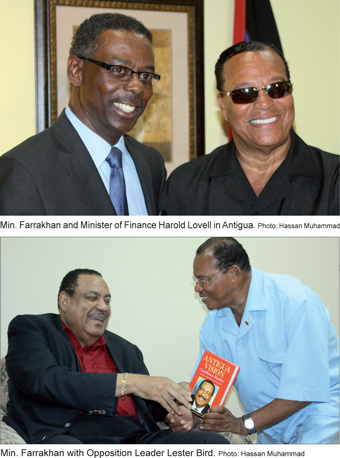
|
Min. Farrakhan’s call for a united Caribbean dovetailed with the history of Antigua and Barbuda and the late V.C. Bird, Sr., who joined with Errol Barrow of Barbados and Forbes Burnham of Guyana and crafted the Caribbean Free Trade Association in the 1960s, the forerunner of the Caribbean Community and Caricom Market which today comprises 15 member states.
“I am only here reinforcing an idea that has already been among us for years but we are not yet politically mature enough to act on it,” Min. Farrakhan told the audience at the Multi-Purpose Center.
He expressed a desire to see Prime Minister Baldwin Spencer successful but added that he did not want to see the two political parties “killing each” other at expense of the country. It will take the prime minister sitting down with Opposition Leader Lester Bird and looking at the problems of Antigua and Barbuda and the West Indies and finding solutions, said Min. Farrakhan.
“Together the West Indies, oh god, you have plenty of riches. There are 40 million of us in the Caribbean, the sons and daughters of Africa. Imagine us united,” he said. Gold and oil are in the Caribbean, in particular in Cuba and Haiti, and the U.S. cannot be allowed to dictate relations between the Caribbean states, said Min. Farrakhan.
“There has to be a political maturity to bring the family all the way together,” he said.
A warm welcome, an enjoyable visit
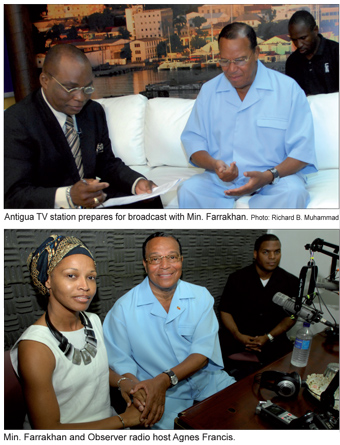
|
Police officials were also on hand for the welcome as was Khalid Shabazz, who represents the Nation of Islam in Antigua, and Alistair Thomas, who met Min. Farrakhan 30-years-ago and was part of the team that worked on the Minister’s visit to the country.
“The prime minister gave me a welcome such as I have never had in all of my travels in the Caribbean,” said Min. Farrakhan, speaking at the Multi-Purpose Center. He also paid respect and tribute to the late V.C. Bird, a leading political figure and first prime minister of the nation, and Police Commissioner Brown and police officers who provided security and escort during his visit.
Khalid Shabazz, a member of the Nation of Islam who has been working on the ground in his native Antigua for about 10 years, was overjoyed at seeing his teacher and admitted crying when he met him.
Bro. Shabazz has the Minister on a weekly Thursday night radio show, which has been on the air for about eight years. From time to time, he has also managed to get the Minister on Antiguan television, the latest success occurred while Min. Farrakhan was actually in the country. Bro. Shabazz speaks in schools to young people, has brought conscious Black scholars to the country and has worked to quell gang violence.
He ordered CDs and other materials, which he distributed on the island as well, downloaded study guides from the Internet and worked to keep some contact with the Nation of Islam Regional Headquarters in Miami. Bro. Shabazz also has a small bookstore in St. John’s where he offers Min. Farrakhan’s lectures and other Nation of Islam information.
His mission has been simple: Spread the teachings of the Honorable Elijah Muhammad.
In January, Bro. Shabazz was able to call into a radio station in St. Kitts and speak briefly on-air with the Minister who said he would be coming to Antigua. A friend heard David Muhammad, the Nation of Islam representative in Trinidad, on the radio in Antigua saying the Minister was coming, and called Bro. Shabazz, who rushed to the station. He met David Muhammad and started working as an advance man for the Minister’s March visit. By his side was Alistair Thomas, who met the Minister 30-years-ago, aired his lectures on radio and attended the Million Man March. It was Mr. Thomas who initially heard David Muhammad on the air. Working with David Muhammad, the two started putting together a team that would receive the Minister properly and worked on a schedule.
The airport arrival and reception were just signs of what was to come during the four-day visit: The Minister spent significant time with Prime Minister Spencer, meeting with him at his office, attending a dinner and then speaking to the Antigua and Barbuda soccer team, which will compete in the World Cup tournament.
Then came media appearances on television and radio, coverage in the Antiguan Observer newspaper and a police escort through the small, winding streets of the capitol city.
At the prime minister’s request, Min. Farrakhan visited a school and spoke to students and teachers about the value of self-knowledge, self-love and aspirations to better oneself and one’s nation.
In his cabinet board room, Prime Minister Spencer warmly greeted the Minister and the Nation of Islam delegation, which included Supreme Capt. Mustapha Farrakhan, his son and aide Joshua Farrakhan, the Minister’s security staff, Seventh Region Student Minister Rasul Muhammad, a son of the Hon. Elijah Muhammad, Trinidad Representative of the Nation of Islam David Muhammad, members of the Final Call video and audio staff and the editor of The Final Call newspaper.
Min. Farrakhan thanked the prime minister March 27 for his great show of respect and hospitality and the political leader responded by expressing respect and admiration for the Minister’s work to improve the lives and lot of Black people.
The two men also discussed the unrealized potential of a united Caribbean and some of Antigua’s developmental needs. They posed for photos before the visit ended and the Minister visited radio station Z DK for a conversation with host Nat Moses and a few calls from listeners. On the air, Min. Farrakhan stressed the need for Caribbean unity to avoid marginalization and then came a visit with host Agnes Francis of Observer Radio 91.1. He answered historic questions about the Nation of Islam. After lunch, the Minister met with Lester Bird, the Leader of the Opposition and son of the man who is a national hero in Antigua for shaping the country politically and whose name the airport carries. Mr. Bird shared some history about his father, efforts to unite the Caribbean and presented the Minister with a copy of his book.
That evening Prime Minister Spencer hosted the Minister and the delegation at dinner at Russell’s at Fort James, a restaurant inside a former fort used by the British, who colonized Antigua. The parties then left for a celebration of the country’s soccer team, the Benna Boys, which will face teams from the U.S., Jamaica and Guatemala in the June round of World Cup qualifying competition. Min. Farrakhan spoke briefly to the team and audience. “What is your attitude Benna boys as you come up against the giant?” asked Min. Farrakhan. “You must have the attitude David had when he met, ‘ain’t nothing too big for me to conquer.’ ”
The next morning the Minister paid a visit to the Ottos Comprehensive School where he was met by Dr. Jacqui Quinn Leandro, minister of education, school Principal Rosalind Beazer, and staff members. The Minister spoke to over 300 school children assembled in a courtyard, urging them to improve and develop themselves for their own good and the good of the country. “A better world doesn’t start with someone else, it begins with you,” he told the students. He also told the students that as divine reflections of God, no subject was beyond their mastery. You must love yourself, respect yourself and see the beauty in who you are, he added. In a separate meeting with teachers, Min. Farrakhan stressed the need for students to have a love for self and knowledge of self as a base for their academic learning. He also called teachers the most important element in society.
A powerful message, a lifetime of work
Few true Black leaders remain on the world stage, commented Alistair Thomas, a Black liberation and political activist based in Antigua. He was one of the major organizers on the ground for the Minister’s visit.
The “most feared,” most consistent Black voice over the past 30 years has been Min. Farrakhan, said Mr. Thomas, who put Min. Farrakhan’s message broadcast over Antigua’s airwaves three decades ago.
“What Farrakhan’s life has demonstrated goes beyond just the Nation of Islam. Because whether you are a Christian, or Rastafarian, or non-believer … let’s come together to do the work,” he said. The seeds of the Minister’s message will bear fruit, he added. “This place will never be the same again.”
Gaston Brown, an official with the main opposition Antigua Labour Party, said Min. Farrakhan shared “very inspiring words, important insights.” The message will resonate with Blacks in the country who feel downtrodden, said Mr. Brown, adding he was happy to have the Minister here.
“He spoke about our inheritance and we inherited our very political system,” Mr. Brown noted. But, he added, Westminster government is on an adversarial system of governing and politics. The system itself does not support the kind of operation that the Minister is fostering, so this really goes back to a colonial inheritance and something that is not a system for us, Mr. Brown said.
There may be a need to replace the system with something that works, he said.
Broadcaster Nat Moses described the Minister’s words as “fantastic, a message of hope” and rebirth of thought and feeling about Blackness lost over the years. It was time for the conversation about Black worth, and self-sufficiency especially with a growing Chinese presence in the Caribbean and Antigua, Mr. Moses said. “We need to stop and think and put aside petty jealousies and move ahead,” he said.
For Prime Minister Baldwin Spencer, “Everything was so on the ball and really assessed or summed up the situation in a very succinct and genuine way, I think the Minister was at his best tonight.” He thanked Min. Farrakhan for a message of a “reassurance and ability to say to ourselves together we can do it.”
The prime minister was pleased Min. Farrakhan decided to visit and happy to have made contribution to ensure the visit was a “tremendous success.”
“I could feel he felt very much at home among his people,” said Prime Minister Spencer, who expressed hope the Minister would return soon and again speak the people. Min. Farrakhan “really connected, everybody was really connected reassuring us we have much to be proud of, it was just overwhelming, absolutely wonderful,” he continued.
Despite some who were concerned about the Minister’s visit, the prime minister said his position was “the man has been making a very significant contribution to the Black race” and had to be treated as a “statesman, someone who has contributed so much to Black civilization.” He spent hours with the organizers to make sure everything was in place.
“The emphasis is on unity and togetherness and we have to find a way to live out what this brother has been saying to us all these years,” the prime minister said.
Mr. Spencer said he totally agreed with the Minister’s call for finding common political ground, and that it reflected views expressed in 2004. “I said we have to pitch a large tent and those who share the vision and want to be a part of the process of nation building and meaningful development have a place,” he said.
Antigua is a small country without huge resources, the prime minister observed. All resources have to be harnessed regardless of politics or party, he said.
“The reality is we have not yet conquered. And we can’t do anything in a divided way. We need to find common ground in the interest of the people of Antigua and Barbuda,” said Prime Minister Spencer.
INSIDE STORIES AND REVIEWS
-
-
About Harriett ... and the Negro Hollywood Road Show
By Rabiah Muhammad, Guest Columnist » Full Story -
Skepticism greets Jay-Z, NFL talk of inspiring change
By Bryan 18X Crawford and Richard B. Muhammad The Final Call Newspaper @TheFinalCall » Full Story -
The painful problem of Black girls and suicide
By Charlene Muhammad -National Correspondent- » Full Story -
Exploitation of Innocence - Report: Perceptions, policies hurting Black girls
By Charlene Muhammad -National Correspondent- » Full Story -
Big Ballin: Big ideas fuel a father’s Big Baller Brand and brash business sense
By Bryan Crawford -Contributing Writer- » Full Story






 Click Here Stay Connected!
Click Here Stay Connected!








